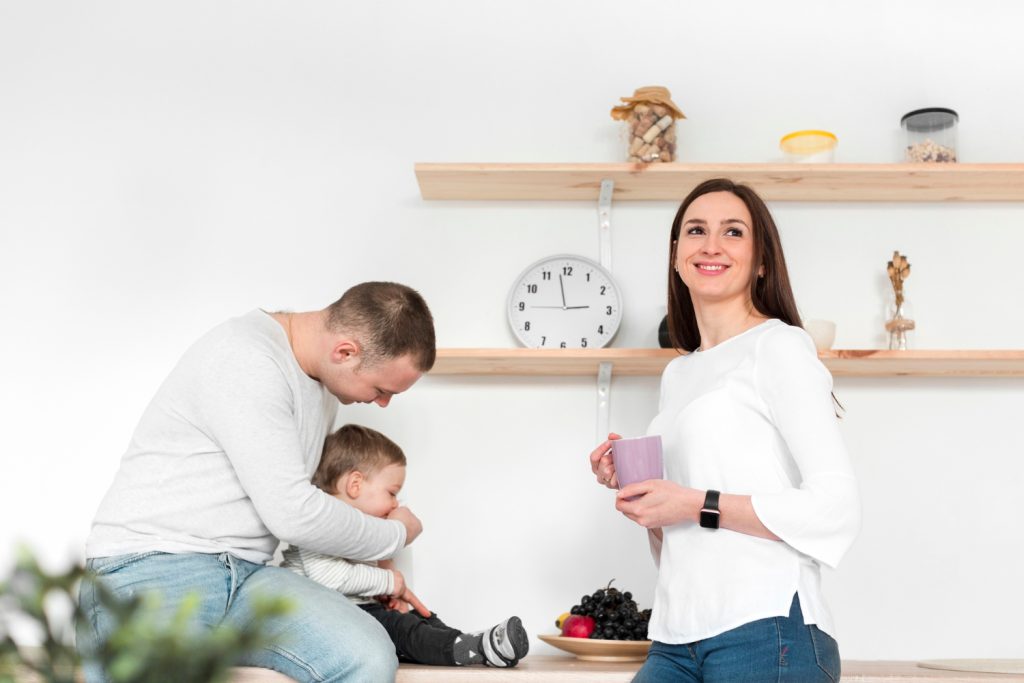Dealing with child custody issues during a divorce is often one of the most difficult and stressful tasks for spouses. Depending on their readiness and possibility to participate in their children’s lives, they can decide on sole or joint child custody.
In recent years, 50/50 child custody arrangements have become increasingly popular. They enable both parents to spend a substantial amount of time with their kids, ensuring the mental stability of children after divorce and sufficient communication with both parents.
It may be challenging to define the custodial parent when both parties have equal rights and obligations to their children. However, it can be required for concluding agreements or signing papers concerning children’s lives in the future.
To help you understand the specifics of equal custody, in this article, we will answer the question, “How does 50/50 custody work?”. In addition, we will analyze how to determine who will be the custodial parent in a 50-50 custody agreement and how to manage co-parenting successfully.
What Is a 50/50 Custody Agreement?
A 50/50 custody agreement is an arrangement between future ex-spouses that determines their equal participation in their children’s lives. Unlike other contracts, this one divides legal and physical custody equally between parents.
What is 50/50 custody in practice? Such division of rights and responsibilities means that children will spend the same amount of time with both parents, while parents will be identically involved in making day-to-day and important decisions about their children.
Although 50/50 co-parenting is often called joint custody, these concepts are slightly different. The main difference between joint custody and a 50/50 agreement is that joint care of children will not always mean that they will spend the same number of days with each parent. In other words, both parents will be involved in raising children, but the division of their responsibilities will not always be 50/50.
Concluding a 50/50 agreement, parents can independently determine the schedule of children’s residence with each of them and a list of additional conditions for their custody. Children can move from parent to parent on a weekly, monthly, or semi-annual basis. It depends on the parents’ arrangement or court order.
Is 50/50 custody best for a child? The answer to this question will usually be affirmative. Co-parenting has a positive effect on parents’ relationships with children and their mental health. In most cases, it may be the best solution for kids and exes. However, in some situations, it may not be appropriate. Their list includes a long distance between parents or the too young age of children.
Who Is the Custodial Parent in a 50/50 Custody Agreement?
Since parents share the same responsibilities in a 50/50 arrangement, they can both be considered custodial parents. Any of them can assume this title by their own agreement or court decision.
To understand who has more chances to be called a custodian, you need to analyze the definition of custodial parent. This can be a mother or a father who spends more time with the children and usually independently makes important decisions about their lives. Given that in 50/50 arrangements, parents agree to equal care of children, it can be difficult to answer the question: “Who is the custodial parent in joint custody?”.
How is the custodial parent determined? You can agree on it yourself or leave it to a judge’s discretion. Most often, the custodial parent will be the one who spends more days with the child. Since there are typically 365 days in a year, one parent will still stay one day more with the children than the other party. Other factors for determining legal representation may be the attachment of children to one of the parents or the flexibility of their working schedules. For example, if one of the parents can visit the children’s school more often, it is more effective if they are specified as their custodians.
Is it necessary to determine who is the custodial parent in 50/50 custody? In most cases, yes. It can be explained by the fact that, in the future, parents will have to sign documents for children’s health insurance or education and will need to indicate the name of the legal custodian on the papers. Most often, it should be one person, so you should determine in advance whose name you will enter as a legal representative.
Regardless of who will be the primary parent in joint custody, the rights and obligations of the other parent will not change. You will still be able to spend an equal or nearly equal amount of time with your children and make decisions about their lives.
What Are the Rights and Responsibilities of a Custodial Parent?
Usually, the custodial parent is one of the ex-spouses who has sole physical and/or legal custody. The list of primary custodian’s responsibilities includes caring for children, representing their interests, and making decisions about their lives. Typically, the custodial parent spends most of the time with the children while the other parent visits them from time to time.
When it comes to 50/50 child custody, the concept of primary and secondary custody is slightly different. Agreeing to an equal division of responsibilities, parents not only undertake to spend the same amount of time with their children but also get 50/50 legal custody. It implies that both of them will participate in all decision-making related to their kids’ lives.
Determining the custodial parent in such cases is more of a formality that will allow more effective communication with third parties.
What Happens If You Don’t Follow a Joint Custody Agreement?
Any 50/50 custody agreement entered into by divorcing spouses must be approved by a judge. Failure to comply with the arrangements specified in the contract will be considered a violation of the court order.
A party that does not fulfill the conditions of a shared custody agreement may get a punishment for contempt of court. It can be a fine or even imprisonment.
If your ex-spouse begins to avoid custodial arrangements over time, you need to inform the court about their irresponsibility and request to modify the terms of the agreement. You can ask for a change in the proportion of your responsibilities or sole custody of the children.
Tips for Successful Co-Parenting in a 50/50 Arrangement
In most cases, joint custody positively affects children and parents. The main benefits of 50/50 custody for kids are the opportunity to communicate and spend quality time with both parents. Using the principle of equal care of children, ex-spouses are proportionally involved in their lives, making them less likely to encounter misunderstandings with kids. However, some parents may find it difficult to get along with each other. To prevent the deterioration of personal relationships, here are some tips on how to cope with co-parenting after a divorce:
Open Communication
You and your spouse need to share information about your children. It can relate to approaches to their education, training, development, etc. Don’t ignore involving the other parent in discussing important issues. Try to find a compromise instead of making decisions on your own.
Flexibility
Each of you may face unforeseen circumstances. You may get sick or have to go on a business trip, affecting your parenting schedules. Be ready to change them and treat the situation with understanding.
Consistency in Parenting Styles
Children who constantly change their place of residence need to maintain the same routine and lifestyle. You need to agree in advance with your spouse what you will allow them and what you will prohibit. You should also discuss the time your kids need to go to bed and the diet for the day they may have.
Respect for Each Other’s Time
If your plans have changed dramatically, you must notify the other parent. Additionally, you should not prevent them from spending time with the children and bring them on time.
Avoiding Conflict in Front of the Child
Sometimes, you may face misunderstandings about raising children. You need to overcome them yourself without involving your kids. Conflicts in front of children can negatively affect their emotional state and lead to the situation when they begin to avoid meetings and open communication with one of you.
50/50 custody has many advantages over sole physical or legal custody. In general, co-parenting can help you improve your relations with children and provide you with an opportunity to spend more time together. Although both parents in a 50/50 agreement have equal responsibilities over their kids, determining the custodial parent can be very important for the legal representation of children.



